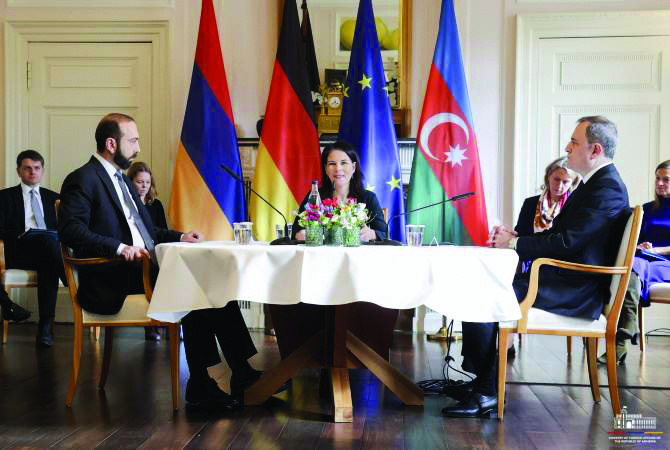
From left, Armenian Foreign Minister Ararat Mirzoyan, German Foreign Minister Annalena Baerbock and Azerbaijani Foreign Minister Jeyhun Bayramov on Feb. 28 in Berlin.
Germany Hosts Armenian-Azerbaijan Talks – And Then?
by Muriel Mirak-Weissbach
the Armenian Mirror Spectator
BERLIN, MARCH 7, 2024 — On February 28-29, German Foreign Minister Annalena Baerbock met with her counterparts from Armenia and Azerbaijan, Ararat Mirzoyan and Jeyhun Bayramov, respectively.
The two-day discussions held in the foreign ministry’s guest house, Villa Borsig, in Berlin were characterized in official releases as “negotiations” centered on perspectives of the draft bilateral Agreement on Establishment of Peace and Interstate Relations between the two nations. Baerbock first held separate talks, then, prior to a trilateral meeting, stated, “We believe that Armenia and Azerbaijan now have an opportunity to achieve an enduring peace after years of painful conflict.” She added, “What we’re seeing now are courageous steps by both countries to put the past behind and to work toward a durable peace for their people.”
In a government press conference held after the talks, press speaker Kathrin Deschauer was tightlipped about specific results, saying only that it could be gleaned from the participants’ statements that “the process would continue.” She said that was “already a step that seems slightly optimistic.” Both visiting foreign ministers had expressed their “appreciation” for the context offered by Germany and were interested in clarifying open questions together, etc. To this end, they planned to meet again and continue the search for a peace agreement.
That a meeting took place at all, is all to be welcomed. But it was much ado about nothing, or at least as far as we know. Much more could have, and should have taken place.
Prior to the encounter, a joint statement was issued by the Central Council of Armenians in Germany (ZAD), the Working Group Against Genocide, for International Understanding (AGA), and the Society for Threatened Peoples (GbV), which defined the conditions for progress in such talks. “Anyone who is interested in peace in the South Caucasus must name the perpetrators by name and act accordingly. Azerbaijan’s foreign minister,” it went on, “represents a dictatorship, that is responsible for the expulsion of 100,000 Armenians from Artsakh/Nagorno Karabakh.” That expulsion followed a blockade in violation of international law, characterized by human rights groups and the human rights expert Luis Moreno Ocampo as genocidal.
The ZAD, AGA, and GbV, recalling the continuing violations by Azerbaijan that threaten Armenia’s territorial integrity, write that the German government has no right “to continue to support this aggressive and hostile policy of the dictator in Baku and force Armenia to a ‘peace’ dictated by Azerbaijan.” Instead of engaging in such a “farce,” the government should “threaten Azerbaijan with effective sanctions, in the event of further acts of military aggression.” The statement calls for Berlin to “clearly and publicly condemn the expulsion of the 100,000 Armenians, demand legal prosecution of this crime, and intervene to secure the liberation of the political prisoners, including three former presidents of Artsakh/Nagorno Karabakh.” The call ends with a condemnation of Azerbaijan’s destruction of Armenian cultural heritage and a demand for effective action.
“Direct dialogue like today and tomorrow is the best way to make further progress,” Baerbock said in her schoolmarm voice. A solution to the longstanding conflict is not going to come with good wishes and pious suggestions, but with effective political action.